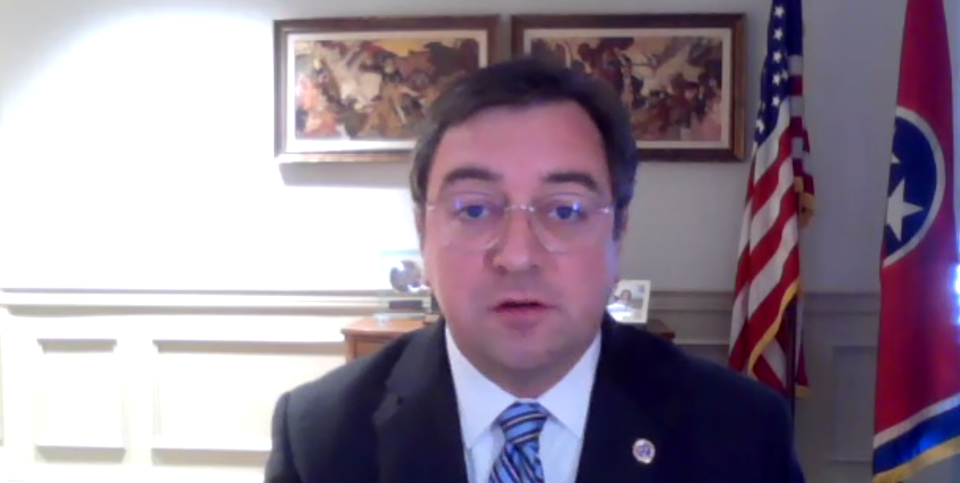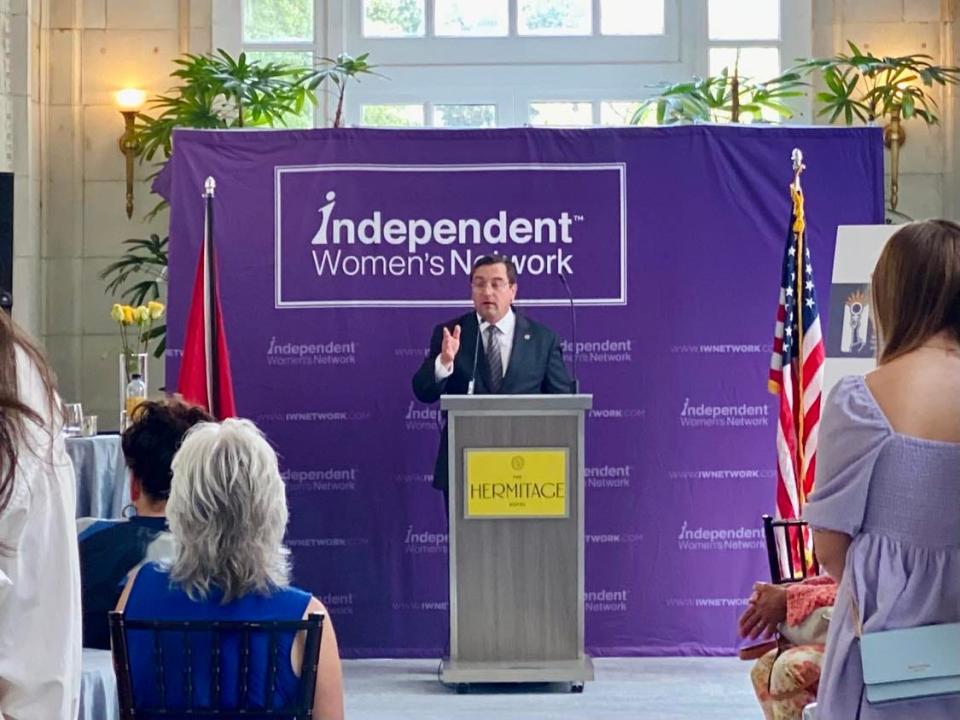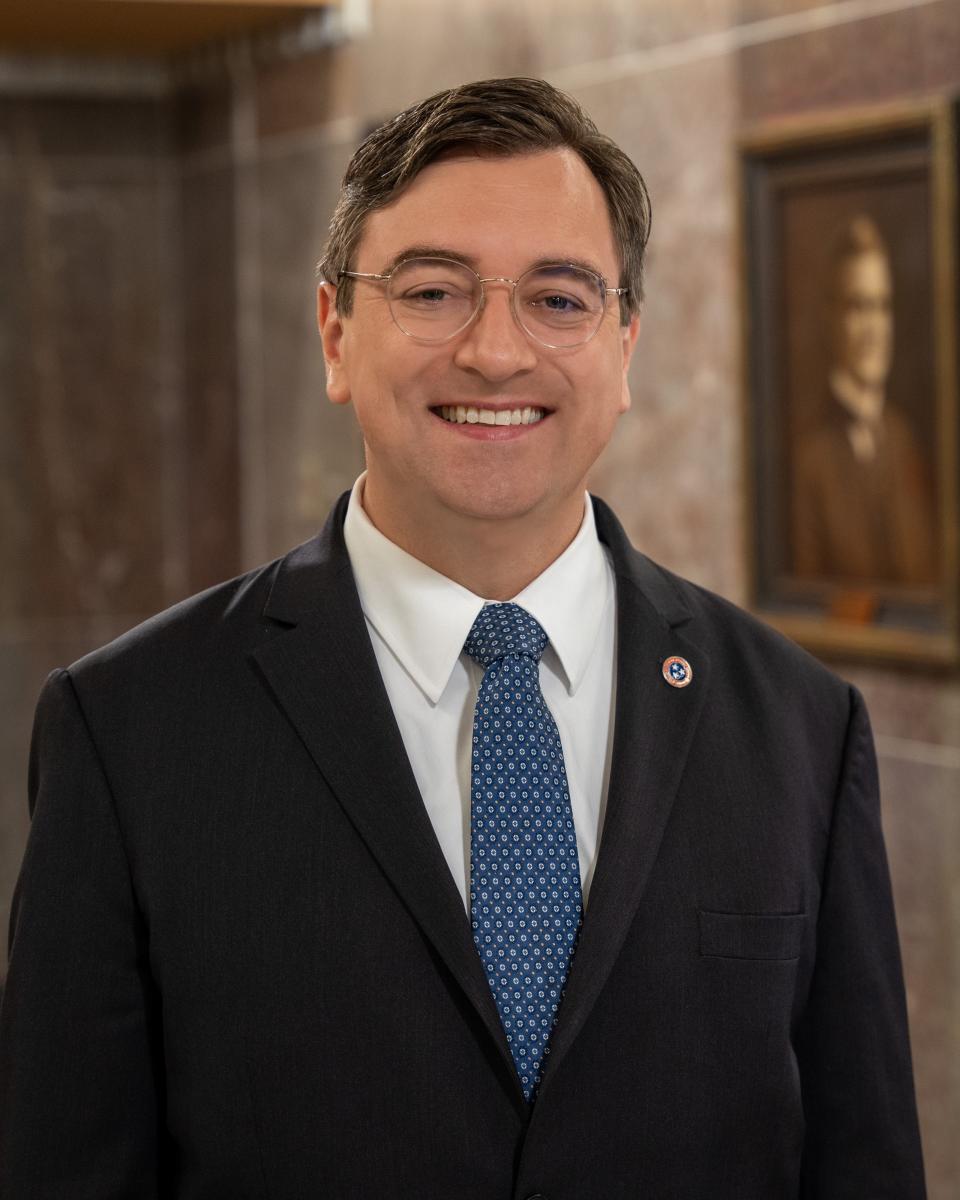Tennessee Attorney General defends controversial cases: 'If I don't step up, who's going to?'
Editor’s note: This interview is Episode 373 of the Tennessee Voices video podcast series.
The Tennessee Supreme Court appointed Jonathan Skrmetti as state attorney general and reporter in 2022. He took his oath of office on Sept. 1.
Most states elect their attorneys general, which is the top law enforcement officer, but Tennessee is the only state where the judicial branch appoints this person. Skrmetti is former federal prosecutor, deputy attorney general, counsel to Gov. Bill Lee and lawyer in private practice.
On Sept. 18, I interviewed Skrmetti for a 20-minute podcast interview.
Skrmetti spoke about his legal career, his philosophy, and how he views his role as well as some recent high-profile cases from the ticket-selling fiasco surrounding Taylor Swift's concerts to requesting records of gender-affirming care patients at Vanderbilt University Medical Center. He also explained why he leads and supports legal challenges to federal authority and that one time (so far) that he could not "in good faith" defend a particular Tennessee law.
Recently, he wrote a guest opinion column titled "Why we must fight to preserve the Constitution" to commemorate the anniversary of the ratification of the U.S. Constitution on Sept. 17.

Below, find an edited version of the transcript. The full version is in the online video and includes the attorney general recounting his career path, sharing how he takes care of his wellness and elaborating on the polarization in American politics.
(Find the video above).
Trans care ban loses: Tennessee's transgender care ban rightly gets rejected by a Trump-appointed judge
Why civics education matters
David Plazas: You just wrote a guest opinion column about the Constitution (published online Sept. 15 and in print on Sept. 17). Would you talk a little bit about what you wrote and why you wrote it?
Attorney General Jonathan Skrmetti: We are a government of the people, by the people and for the people we run ourselves. And we're responsible for our own government. And I think over the generations, and maybe every generation feels this way, we feel like our civics education is slipping, and people don't appreciate the tremendous responsibility that each of us has for our own government. People feel more alienated, more disaffected. And so part of it is just reminding people, here's how the nuts and bolts of our government works. Here's how separation of powers and Federalism work.
Tennessee AG Jonathan Skrmetti: Why we must fight to preserve the Constitution
And don't forget that you are responsible for this, that ultimately everything that happens in our government owes itself to the people, and if people feel like the government has gotten away from them, if they feel like things are moving in a bad direction, they have means to push back. And obviously you need a majority to make a difference. But at the very least you have the opportunity, and if you can persuade other people and persuade elected officials that your position is the right one. Then you're able to change what Government's doing. And I hope that by reminding people of the basic civics I can help reverse some of the alienation people are feeling toward government these days.
Hear more Tennessee Voices: Get the weekly opinion newsletter for insightful and thought provoking columns.
Why Jonathan Skrmetti pushes back against 'federal overreach'
Plazas: Unlike most states, you're appointed by the Supreme Court, not elected democratically, but still you are a constitutional officer that has to represent the people. How do you approach what you defend what you choose? Or do you even have a choice in that?
Skrmetti: So, I think the most important thing for me to always remember in my position is that I'm not a policy maker. My job is to be the lawyer for the state. That means defending the state's laws, except in those rare instances where there's just not a good faith argument that they're constitutional. I've only done that once.
And I expect that it won't happen very often whether I agree with particular positions or not. My job is to be a good attorney for the state, and that doesn't just mean defending things. That means identifying ways that the law can be used to advance the state's policy interests. That's where a lot of the pushback against the federal government comes from is, you know, seeing federal overreach that's inhibiting the ability of the State to make its own choices about policies. The constitutional structure doesn't allow for that. And as the state's lawyers, my job to push back and let the elected officials make the choices that they were elected to make.
Sign up for Black Tennessee Voices newsletter:Read compelling columns by Black writers from across Tennessee.
What the Taylor Swift ticket scandal was really all about
Plazas: You have certainly been in the news in the last year, because whether it's about Taylor swift tickets, or whether about the Vanderbilt University Medical Center and the trans care. Would you talk about what you can about those cases of why those particular issues? And how should the public understand it? Because it's very easy to say, well, it's about this or that, and you have these divisive arguments. But why is it your role to go into those cases, for example?

Skrmetti: So for Taylor Swift, and in the ticketing industry, state AGs are the guardians of consumer protection. Every state has given its attorney general broad power to pursue deceptive and unfair trade practices to sue for antitrust violations, and so a big part of my job is doing just that – aggressively looking out for the interests of consumers and in the ticketing industry.
I remember Pearl Jam testifying in Congress about some of the problems with the ticketing industry, and, if anything, over the last 30 years, they've gotten worse. So, this is an area where the market structure is broken down. It's not the case of the century. There's a lot of more important stuff out there, but it is important. It's particularly important to Tennessee, given the music industry's prominence across the state.
And seeing conduct that looks like it may well violate in fairly significant ways important laws that we have to protect consumers. If I don't step up, who's going to? And this is an area, too, where there's a lot of good opportunity for state-federal cooperation.
I know some people think all I do is fight with the federal government, and you know we fight with them a lot over appropriate issues. But there are areas like this where we're pretty aligned and where I think there's opportunity for cooperation going forward to fix the problem.
Sign up for Latino Tennessee Voices newsletter:Read compelling stories for and with the Latino community in Tennessee.
AG: VUMC gender-affirming care case is Medicaid fraud investigation, not persecution of trans patients
Plazas: And with a VUMC case, that's a very interesting one. I know there are particular legalities to it, but it has been framed by some as this is the AG's office picking on patients, or trans patients in particular. How do you see this particular case?

Skrmetti: So, this is a case that should not have come to the light of day, and ordinarily wouldn't have until there was a complaint that set out exactly what the legal problems were. It's a Medicaid fraud and false Claims Act investigation looking at the billing practices of Vanderbilt; it's got nothing to do with any of the patients.
I recognize people are concerned about their medical records. But in every case where we look at medical billing, we have the legal right to. And we need to go through the case files to determine whether there's any fraud in the billing.
This case originated when one of my lawyers found a YouTube video of one of the VUMC doctors talking about changing the billing code for treatment for gender dysphoria, because if it was identified as gender dysphoria treatment under certain plans, it wouldn't be reimbursed.
And that's a very rare thing. Usually in fraud cases, it's pretty tricky to show intent … but it was certainly something that merited looking into, and these investigations take a long time, because we like to do a good job. Make sure they're thorough. If there's a case there, it needs to be a solid case. That's well developed.

But my hope is that once everything plays out, people will realize that it's just a total canard to say that this is some sort of persecution of the patients.
You know I get in the current environment why people are concerned. Things are very hot and hostile and contentious, but this is a fraud case and you know there's a lawsuit against Vanderbilt about it. All the facts are going to come out over time, and I'm confident that people will see what it is, and that we'll do our job as the Ag's office appropriately.
Why do Republican and Democratic AGs coordinate with each other on lawsuits?
Plazas: One of the things that you had alluded to was this this notion of that tension between the federal government and the state government? This is something you wrote about in your in your op-ed. And we've seen in recent years … attorneys general, whether in Democratic States or Republican States, taking on different cases, being cases about the Deferred Action For Childhood Arrivals are taking on issues of refugee resettlement. Your predecessor chose not to sue the federal government in that particular case despite the State law. How do these conversations come together with other attorneys general?
Skrmetti: So the Constitution sets out the structure for lawmaking. The federal government is the supreme government, but its powers are limited, and it has to act within the scope of those powers. All the other governing needs to be done at the State level or lower.
And so drawing the bright lines between what the federal government's authorized to do, and what the states are allowed to do is a really important part of my job. So, we look at what the federal government's doing, where it bumps up against the state's policies, and if the federal government is overreaching.
Depending on the situation, we either push back or we coordinate with one of the other AGs. The Republican AGs talk to each other frequently. We also have bipartisan get-togethers and talk frequently about consumer protection issues, but for the constitutional stuff, it's typically a partisan arrangement. And you get different people who have different priorities. Some people really get into certain issues, either because of political reasons, or because they have a passion for it, or because their state is particularly involved in it.
I'm very interested in administrative law and in the limits on the regulatory state. And so we tend to lean a little more in that direction. It's a little bit nerdier, but I think that's consistent with the fact that I'm not an elected AG, and I don't have to throw red meat out there the way that some of my colleagues do.
And so we in theory, we take the blander cases more. But it's been a much more interesting and exciting year than I anticipated. And obviously there's a lot of controversial stuff going on.
This is the Tennessee law that Skrmetti would not in 'good faith' defend and why
Plazas: You mentioned that there was a case that you decided not to pursue because of a good faith argument. Could you talk a little bit about that in your and how you made that decision.

Skrmetti: Sure. So it was the Beeler case (Beeler v. Long). It was a case that said that if you were between 18 and 20 years old your gun ownership rights were restricted and you had to be 21 with some limitations for like military service and honorable discharges. But the gist of it was, if you were 18 to 20, you were being treated differently with respect to a constitutional right than if you were 21 and older and conceptually, that's just not feasible. You're not allowed to say, for instance, that if you're over 21 you can do early voting, but if you're 18 to 20 you have to vote on Election Day. You can't say you're not allowed to publish op-eds if you're 18 to 20. Once you turn 18 and reach the age of majority. the rights that apply to the people apply. And I realize this is an extremely controversial policy area, but constitutionally, I just did not see an argument that we could make with a straight face that you could carve out 18 to 20 year-olds. And I know some people said it was a nakedly political decision, but recently we've seen a Biden appointee up in Minnesota reach the same conclusion in a case presenting those issues and it all stems or at least, in part, stems from the Bruen decision from the U.S. Supreme Court. And we see broader and broader ramifications from that emerging all the time. I know people didn't like it. I know people have policy arguments against it. But legally. I just don't see a way that you can carve out age groups like that. And I stand by the decision.
Final words of wisdom from Skrmetti's interview
One thing I would say is. you know, for anybody who has any interest in achieving a position of influence, you’ve got to remember that our nation is built on the idea that people are fundamentally equal, and there's no stratification under the law between the important people and everybody else, or between the smart people and everybody else, or between the rich people and everybody else. Everybody is equal. Everybody is entitled to exactly the same consideration.
And so we're going to disagree about what that means. In practice. We're going to disagree about what the best policies are, but we always need to remember the fundamental truth that each and every American counts exactly the same.
David Plazas is the director of opinion and engagement for the USA TODAY Network Tennessee. He is an editorial board member of The Tennessean. He hosts the Tennessee Voices videocast and curates the Tennessee Voices and Latino Tennessee Voices newsletters. Call him at (615) 259-8063 or email him at [email protected].
This article originally appeared on Nashville Tennessean: Taylor Swift tickets exposed an industry. Tennessee AG went after them
